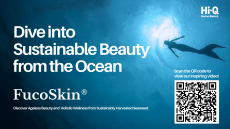Ethics and sustainability ‘top beauty concern’ for most UK consumers

A majority of UK consumers believe personal care and beauty brands should put more effort into manufacturing products in an ethical and sustainable way, and this isn’t just a passing fad, says Leatherhead’s head of consumer and sensory insight.
An online survey of 2,029 British adults conducted by Leatherhead Food Research and Sagentia, both part of consultancy specialist Science Group, found that 79% of consumers believe personal care and beauty brands should put more effort into manufacturing products in ethically and sustainably.
Results showed female consumers felt “significantly more strongly” about ethics and sustainability, with 85% saying more effort should be made versus 73% of men making this statement.
Ethics and sustainability were also influential in purchasing decisions across demographics, with 34% citing these product values important; just ahead of sensory characteristics (31%) and natural ingredients (30%) but behind value for money (67%) and functional benefits (54%).
Ethics and sustainability ‘a lasting movement, not a passing fad’
“The debate about ethics and sustainability has been dialled up in the last few years and it looks like a lasting movement, not a passing fad,” Emma Gubisch, head of consumer and sensory insight at Leatherhead, told CosmeticsDesign-Europe.
“Personal care and beauty brands need to ensure this becomes a central driver of product development, rather than an afterthought. Afterall, new entrants to the market will build these values into the very foundation of their business model and products.”
However, ‘ethics’ and ‘sustainability’, she said, remained “big terms encompassing a complex range of ideas and concepts” – not simple for consumers or industry to fully understand or address.
“It helps to focus on what is meaningful to consumers, drawing on areas that they can understand, visualise or experience directly. Fundamentally, consumers want to feel that they can trust companies to do the right thing in the manufacture of products,” Gubisch said.
That could include several aspects, she said, from treating employees fairly to sourcing ingredients in an ethical way. “It’s partly about the backstory behind the product and ensuring it embodies the things that are important to consumers. But it’s also about the direct experience with the end product and its packaging.”
Consumers easily got “swept along with big stories” like single-use packaging, she said, but any brands looking to address such high-profile consumer issues had to stand up to scrutiny from potentially cynical consumers. “It’s not enough to pay lip service to these things,” she said.
Think product packaging, firstly…
Asked if there were specific segments within beauty and personal care that provided opportunity to tap into ethics and sustainability concerns, Gubisch said packaging was a great starting point and many brands had already started to work on this; reducing, redesigning and even eliminating.
“Aside from marketing, product packaging is the first opportunity to convey messages about ethics and sustainability to consumers. So, it’s important to think about what the packaging says, both implicitly and explicitly.”
She said luxury brands shifting to more of a minimalist approach, for example, could “drive radical changes” – ultimately transforming consumer cues for luxury.
“Striking a balance that works for consumers is a challenge. But increasingly, ethics and sustainability is becoming a hygiene factor – a ‘must have’ rather than a ‘nice to have’. In many ways, it’s becoming like the ‘healthy and nutritious’ element that food and beverage brands have to factor in new innovations,” Gubisch said.





























